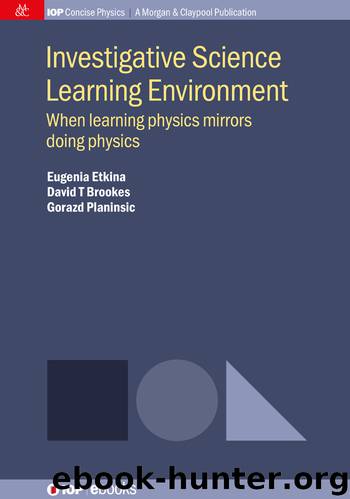Investigative Science Learning Environment: When learning physics mirrors doing physics by Eugenia Etkina David T Brookes Gorazd Planinsic

Author:Eugenia Etkina, David T Brookes, Gorazd Planinsic
Language: eng
Format: epub
ISBN: 9781643277806
Publisher: IOP Publishing
Published: 2019-10-31T16:00:00+00:00
The gap between school and real-life learning
Schooling, or learning in a school setting has become (maybe it was always this way?) far, far removed from real-life learning. What do I mean by real-life learning? Think about something you’re good at; a hobby, like cooking or computer gaming. For example, I’m a good musician; I play the bassoon with a fair amount of competence that at one point allowed me to play in a professional orchestra. Think about how you became good at your hobby. Were you good at it from the beginning? I was terrible at the bassoon for about three years straight until I had the good fortune to find a teacher who focused on teaching me how to develop the skill of deliberate practice (Ericsson et al 1993). Even then, it took me another three years of 3-hours-a-day deliberate practice to become competent. Think about how many hours you spent working at your hobby. Think about how many times you sucked and wanted to quit, but you didn’t, you persisted. This is what real learning looks like. It is hard, it’s messy, it requires persistence, motivation, and tolerance of failure. I highly recommend watching Yung Tae Kim’s TED talk on YouTube: https://youtu.be/lHfo17ikSpY. In real-life learning, such as learning to skateboard, failure is normal. You start out as a novice, and as a novice you don’t know what you’re doing. You are going to stumble and fall a lot. Learning from one’s mistakes is critical to success. Persistence and reevaluating one’s performance based on feedback crucial if you are going to improve. Skateboarders keep practicing until they master a trick. There is no time limit on this process. As Dr Tae points out in his talk, learning isn’t fun; it is more like flow (Csikszentmihalyi 1990).
Students’ most common or familiar experience of school learning is totally at odds with what I’ve described above. Students mostly sit passively listening to the teacher. Facts and procedures are memorized and regurgitated on the test. The teacher is always rushing from one topic to the next, making sure they ‘cover’ the material. The teacher is the final arbiter of correctness and failure is bad. That is their expectation and experience of what school learning is and should be. Students’ expectations are violated when they enter an authentic inquiry-learning environment, such as ISLE, because, if properly designed, that learning environment looks more like learning to skateboard or play the bassoon, and less like ‘traditional’ school learning. ISLE is structured around having students investigating physical phenomena using authentic scientific practices. They are not told what to do; they are the authors of their knowledge! Students get multiple opportunities to improve and resubmit their work. For some students (those who have been struggling in the traditional school setting), taking my physics class is the first time they have been free to ask questions, challenge authority, and be masters of their own learning. They take to the class like a duck to water, but they are only a minority.
Download
This site does not store any files on its server. We only index and link to content provided by other sites. Please contact the content providers to delete copyright contents if any and email us, we'll remove relevant links or contents immediately.
Enlightenment Now: The Case for Reason, Science, Humanism, and Progress by Steven Pinker(7304)
A Journey Through Charms and Defence Against the Dark Arts (Harry Potter: A Journey Through…) by Pottermore Publishing(4798)
The Immortal Life of Henrietta Lacks by Rebecca Skloot(4571)
A Journey Through Divination and Astronomy by Publishing Pottermore(4377)
Elon Musk by Ashlee Vance(4118)
Origin Story: A Big History of Everything by David Christian(3680)
COSMOS by Carl Sagan(3617)
Alchemy and Alchemists by C. J. S. Thompson(3509)
Bad Pharma by Ben Goldacre(3420)
Enlightenment Now by Steven Pinker(3364)
Shadow of Night by Deborah Harkness(3356)
Inferior by Angela Saini(3310)
A Mind For Numbers: How to Excel at Math and Science (Even If You Flunked Algebra) by Barbara Oakley(3294)
Origin Story by David Christian(3192)
The Code Book by Simon Singh(3175)
Signature in the Cell: DNA and the Evidence for Intelligent Design by Stephen C. Meyer(3123)
The Elements by Theodore Gray(3050)
A Brief History of Time by Stephen Hawking(3019)
A Journey Through Potions and Herbology (A Journey Through…) by Pottermore Publishing(2844)
